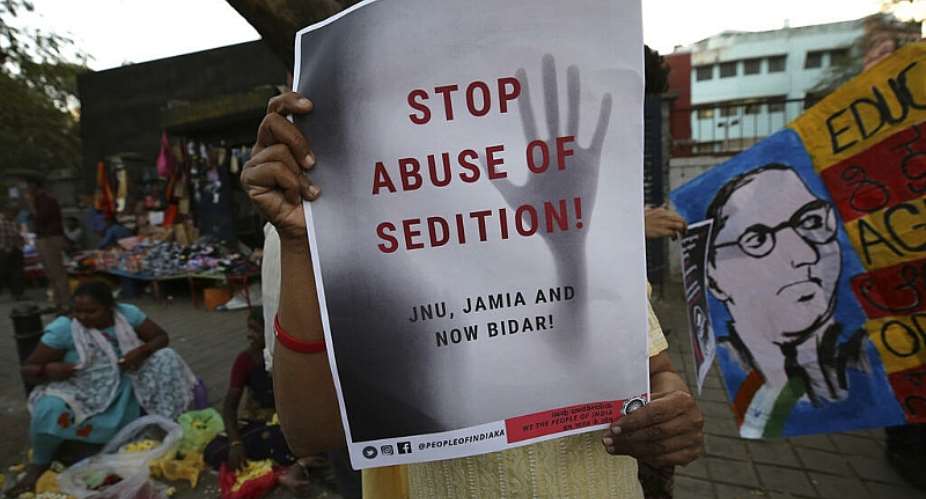India's top court has suspended a colonial-era sedition law pending a review. The decision will impact hundreds of people who have been charged under the code which, rights groups say, has stifled liberty in the world's largest democracy.
This is the first time a criminal law has been temporarily frozen by the Indian courts. The three-judge bench said those held on sedition charges can seek bail in the interests of balance between the security of the state and personal liberty.
"It will be appropriate not to use this provision of law until further re-examination is over," Chief Justice NV Ramana said as the government offered to reconsider the 152-year-old law after having stoutly defended it.
Civil liberties campaigners want the suspended law off the books permanently. Rights organisation Amnesty International has hailed the verdict.
“We are looking for the entire law to be struck down,” said retired major general Sudhir Vombatkere who led the legal battle against the law called Section 124-A.
Case pile-up
Provisions of 124-A have been invoked 326 times in six years since the Hindu nationalist BJP party came to power in 2014.
But only half a dozen suspects were convicted in court in that period, newspapers said.
Assam reported the largest number of 54 sedition charges but not a single case led to conviction between 2014 and 2019 in the BJP-ruled state.
The states of Kerala, Bihar and Kashmir each logged 25 such cases, also without a single conviction in courtroom trials.
A young climate change activist was among those acquitted or offered bail across India as police struggled to convince judges that these men and women had waged war against the state.
Supreme Court lawyer Kapil Sibal told Ramana that 13,000 people were in jail and 800 trials were pending under Section 124-A.
The law was used against Mahatma Gandhi and others leading India's struggle for freedom from British imperial rule in the 19th century.
The big debate
“Sedition law is out of place in a mature democracy like ours,” said former Supreme Court judge Ashok Ganguli.
“We are no longer subject to a foreign country and, as free citizens of a democratic country which is a republic, we have the right and duty to criticise the government,” the judge added.
But Satyapal Jain, a solicitor-general and ruling party spokesman, insisted India needed tough laws such as 124-A.
"We have to ensure the unity and integrity of the country and we have to punish those who indulge in sedition activities as defined by the Supreme Court but, at the same time, we have to ensure that innocent people are not victimised and no injustice is done to them,” Jain told TV.
Britain struck the controversial sedition law off its books in 2009.
- Sedition law in India being examined by country's top court
- Criminal identification bill in India raises fears of shadowing
The three Indian judges in their ruling also ordered courts to put on hold all existing sedition trials, telling federal and state administrations not to register new cases under 124-A.
Experts such as former solicitor-general Pinki Anand said the verdict was likely to lead to confusion.
“You have matters that are pending. What will happen to those cases? What will happen to people who are in jail? What will happen to people who have bail and what will happen to cases which have multiple charges?” she asked.
But others like Chitranshul Sinha, who authored a book entitled The Great Repression warned red flags can be lowered only after laws such as 124-A have been done away with.
“Till the time safeguards are built ... the law of sedition will keep rearing its head under different names, despite the orders passed by the Supreme Court,” he said.





 Former Kotoko Player George Asare elected SRC President at PUG Law Faculty
Former Kotoko Player George Asare elected SRC President at PUG Law Faculty
 2024 elections: Consider ‘dumsor’ when casting your votes; NPP deserves less — P...
2024 elections: Consider ‘dumsor’ when casting your votes; NPP deserves less — P...
 You have no grounds to call Mahama incompetent; you’ve failed — Prof. Marfo blas...
You have no grounds to call Mahama incompetent; you’ve failed — Prof. Marfo blas...
 2024 elections: NPP creates better policies for people like us; we’ll vote for B...
2024 elections: NPP creates better policies for people like us; we’ll vote for B...
 Don’t exchange your life for wealth; a sparkle of fire can be your end — Gender ...
Don’t exchange your life for wealth; a sparkle of fire can be your end — Gender ...
 Ghana’s newly installed Poland train reportedly involved in accident while on a ...
Ghana’s newly installed Poland train reportedly involved in accident while on a ...
 Chieftaincy disputes: Government imposes 4pm to 7am curfew on Sampa township
Chieftaincy disputes: Government imposes 4pm to 7am curfew on Sampa township
 Franklin Cudjoe fumes at unaccountable wasteful executive living large at the ex...
Franklin Cudjoe fumes at unaccountable wasteful executive living large at the ex...
 I'll 'stoop too low' for votes; I'm never moved by your propaganda — Oquaye Jnr ...
I'll 'stoop too low' for votes; I'm never moved by your propaganda — Oquaye Jnr ...
 Kumasi Thermal Plant commissioning: I pray God opens the eyes of leaders who don...
Kumasi Thermal Plant commissioning: I pray God opens the eyes of leaders who don...
